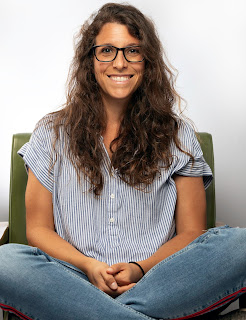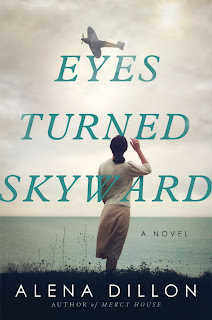Alena Dillon is the author of the new novel Eyes Turned Skyward. Her other books include the novel Mercy House, and her work has appeared in a variety of publications, including The Daily Beast and LitHub. She lives on the north shore of Boston.
Q: What inspired you to write Eyes Turned Skyward, and how did you create your characters Kathy and Peggy?
A: I originally intended to write a fictional account of my great aunt's travels across the country from New York to California back in the ‘50s, which was an unusual adventure for a woman at that time.
As I began researching the period, curiosity drew me further back into the ‘40s, until I landed on mention of the Women Airforce Service Pilots (WASP), the first women to fly military aircraft in our country.
I'd never heard of them before, and was surprised and delighted by all they accomplished, while being affronted on their behalf that they remained largely anonymous even to this day.
I was interested by the phenomenon of women being called to the work force for the first time, and how meaningful that must have been for an individual who was particularly hungry for use, followed by the heartbreak and outrage that must have been triggered by being suddenly no longer needed, and even erased from history.
That conceit birthed the character of Peggy, and Kathy was her natural foil, a daughter who didn't wish for greatness and was badgered toward it by a mother who'd been denied.
Q: The author Marjan Kamali said of the book, "Dillon has written a compelling and moving dual-timeline story about the lasting ramifications of misogyny, grief, and the histories we don’t know about the those we love the most." What do you think of that description?
A: It makes me blush. This endorsement touches on so much of what I hoped to convey in the novel, and to have Marjan, an author I admire, not only read the manuscript but connect with the story and characters as I'd envisioned them, is immensely satisfying.
I wanted to demonstrate the ways in which misogyny has evolved without disappearing, and how much we don't know about those we are closest to, especially our parents, who had lives prior to our existence that we can never see. Any trauma they experienced is a silent influencer on how we are raised. It's something we always feel without ever understanding.
Q: How did you research the novel, and did you learn anything that you found especially compelling?
A: The novel is 10 years in the making. The original version was set entirely in WWII, and included Peggy working in a defense factory before embarking on her WASP journey, so there was a lot of research that ultimately went unused about riveting and California, etc.
As for the WASP aspects, I am grateful for the Wings Across America project by Baylor University, which hosts extensive primary and secondary resources about the WASP, including interviews, documents, and original records.
In addition, I read articles, memoirs, and historical fiction as well as watched documentaries, ceremony footage, and airplane demonstrations. I probably referenced Google on almost every page to check on various details, right down to 1940s soap.
I was constantly surprised by what I found, to the point where I shouldn't have been surprised any more. One tidbit that caught me especially off guard was the menstruation study that was conducted by the government to determine whether the periods of female pilots contributed to accidents. Incidentally, they did not.
Q: How was the book's title chosen, and what does it signify for you?
A: Over the course of the story's life, there have been at least six other titles. In the end, I returned to the original.
Eyes Turned Skyward is taken from a Leonardo da Vinci quote. “Once you have tasted flight, you will forever walk the earth with your eyes turned skyward, for there you have been, and there you will always long to return.” It captures Peggy's longing, whose perpetual presence pressured her daughter and their relationship.
Q: What are you working on now?
A: I'm working on a novel about postpartum mood disorders. I wrote a memoir about pregnancy and new motherhood called My Body Is A Big Fat Temple that came out last year, and I've found that my interest in the subject has only deepened as I had a second baby. I'd like to explore the themes further with the freedom afforded by fiction.
Q: Anything else we should know?
A: You can stay up to date on events and upcoming projects by following me on Instagram at alena.dillon
--Interview with Deborah Kalb. Here's a previous Q&A with Alena Dillon.


No comments:
Post a Comment